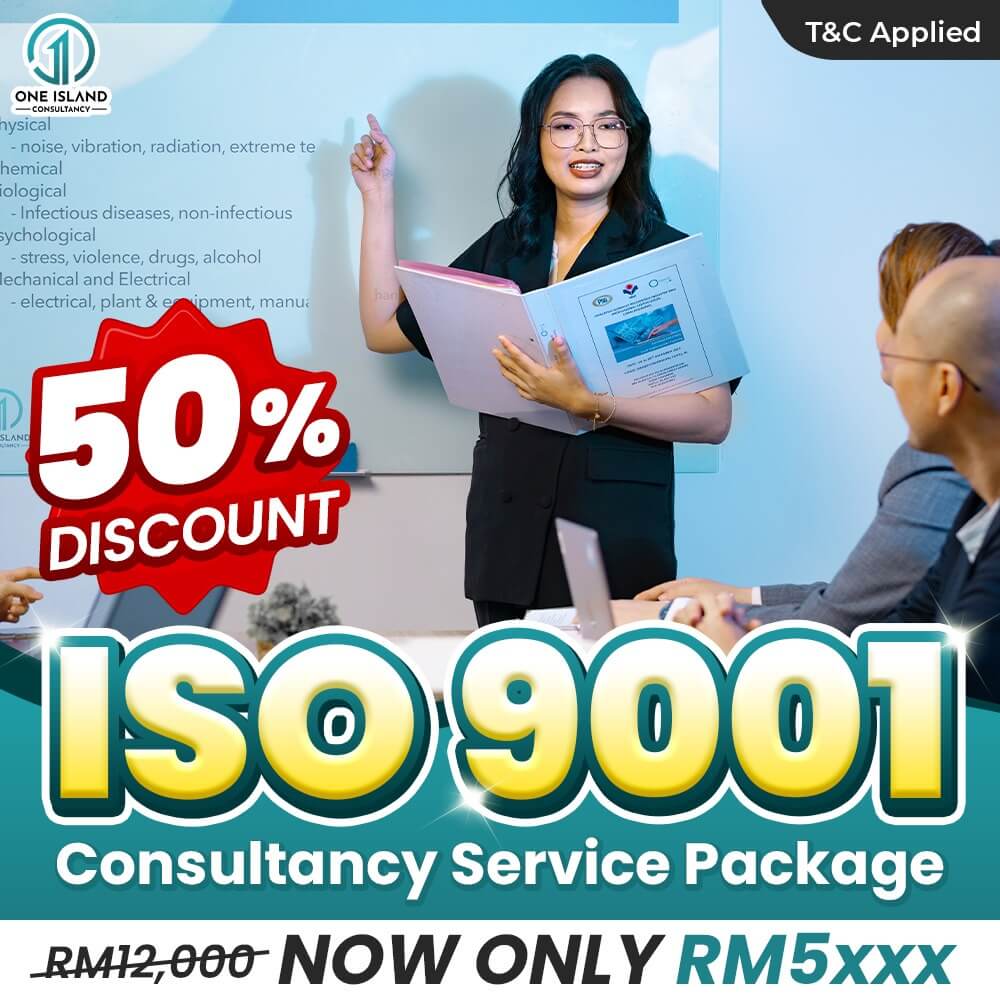
What Is ISO 9001 in Malaysia?
ISO 9001, including its certification in Malaysia, sets the global standard for a Quality Management System (QMS) adopted universally by organisations. This framework empowers businesses to consistently enhance their systems, processes, and products, meeting customer satisfaction and needs.
Its latest version, ISO 9001:2015, outlines how organisations operate to fulfill stakeholder and customer requirements. Connect with our ISO training providers in Malaysia for valuable insights and guidance.
ISO 9001 Certification for Different Industries in Malaysia
ISO 9001 in Malaysia benefits businesses across various industries. Here’s how it applies to different sectors:
ISO 9001 Certification in Malaysia for Manufacturing Companies
Manufacturing companies in Malaysia can greatly benefit from ISO 9001 certification by optimizing production processes and ensuring consistent product quality. With ISO 9001, manufacturers can implement best practices in quality management, reduce production errors, minimize waste, and improve operational efficiency. This results in cost savings, higher customer satisfaction, and a competitive edge in both domestic and international markets.
ISO 9001 Certification in Malaysia for Service Providers
Service-based industries in Malaysia, such as hospitality, finance, IT, and healthcare, can also benefit significantly from ISO 9001 certification. By implementing a robust Quality Management System (QMS), service providers ensure that their services meet customer expectations, improve customer experience, and adhere to industry regulations. Whether in customer support or IT services, ISO 9001 certification helps standardize processes, ensuring consistent and high-quality service delivery.
ISO 9001 Certification in Malaysia for SMEs
Small and Medium Enterprises (SMEs) make up a large portion of Malaysia's economy, and ISO 9001 certification in Malaysia can help these businesses achieve sustainable growth. By adopting ISO 9001, SMEs can implement structured quality management practices that improve their operations, increase efficiency, and build credibility with clients. This certification is particularly valuable for SMEs looking to expand into international markets, as it assures customers of consistent quality and reliability.
ISO 9001 Certification in Malaysia for Healthcare Providers
In Malaysia’s healthcare sector, patient safety, service quality, and compliance with regulations are paramount. ISO 9001 certification helps healthcare providers improve patient care and streamline administrative processes by implementing standardized procedures and protocols. Hospitals, clinics, and medical device manufacturers that adopt ISO 9001 can ensure the highest levels of service quality, minimize errors, and foster trust among patients and regulatory bodies.
ISO 9001 Certification in Malaysia for the Food and Beverage Sector
The food and beverage (F&B) industry in Malaysia is highly competitive, and ISO 9001 certification helps F&B businesses maintain high standards of product quality and hygiene. By implementing ISO 9001, F&B businesses can improve product consistency, enhance food safety, and meet regulatory requirements. This certification helps companies build credibility, reduce operational risks, and ensure that their products meet consumer expectations for taste, safety, and quality.
Benefits of Having ISO 9001 Certification
in Malaysia
Achieving ISO 9001 certification provides several benefits for businesses:
Who Would Need ISO 9001 Certification in Malaysia?
ISO 9001 certification is suitable for any organisation, regardless of its industry or size. Whether you're involved in manufacturing or service delivery, achieving ISO 9001 in Malaysia involves setting up a comprehensive Quality Management System (QMS) with effective performance monitoring.
Common organisations seeking ISO 9001 certification in Malaysia include:
How to Become Certified in ISO 9001
in Malaysia?
Steps to Obtain ISO 9001 Certification
Request for Quotation
Contact us to choose a package that suits your needs for ISO 9001 in Malaysia.Book a Consultation
Schedule a free initial consultation with our experts.ISO Training Introduction
Equip your organisation with essential knowledge to demonstrate commitment to quality and customer satisfaction through ISO 9001 training.Prepare and Implement Documents
Identify the necessary documentation for your processes and quality system, then implement them to align with ISO 9001 Certification in Malaysia requirements.Conduct Internal & External Audits
Ensure your Quality Management System (QMS) complies with international standards through thorough internal and external audits.Obtain Certification & Showcase
Obtain your ISO 9001 Certification Malaysia and display it proudly on your website and marketing materials.
How Much Will It Cost to Get ISO 9001
Certification
in Malaysia?
The cost of ISO 9001 certification in Malaysia depends on various factors unique to each organisation. Understanding these factors is essential for budgeting and planning your certification journey. Let’s break down the key elements that influence the cost and what you can expect.
9 Key Factors Influencing ISO 9001 Certification Costs.
Organization Size and Complexity
Larger organizations with more employees, multiple departments, and intricate workflows tend to incur higher certification costs. This is due to the additional time and resources required for comprehensive audits and Quality Management System (QMS) implementation. Smaller organizations or those with streamlined processes typically face lower expenses.
Scope of Certification
The scope of certification greatly impacts costs. Certifying specific departments, processes, or sites is generally more affordable than certifying the entire organisation. Clearly defining your certification boundaries can help manage expenses.
Consultancy Services
Hiring ISO consultants to guide your QMS implementation is a common approach, particularly for organisations new to ISO 9001. Consultancy costs vary based on the consultant’s expertise, the level of involvement needed, and the organisation’s readiness. While this is an added expense, it often accelerates the certification process and ensures compliance.
Employee Training and Awareness
Proper training is critical for a successful ISO 9001 implementation. Costs depend on the number of employees and the training provider. Workshops and in-house sessions tailored to your organisation's needs might be more cost-effective than external programs for larger teams.
Documentation Development
ISO 9001 requires extensive documentation, including policies, procedures, and records. Organisations can opt for ready-made templates, software solutions, or professional assistance to create compliant documentation, with costs varying based on the chosen approach.
Internal Audits
Conducting internal audits ensures your organisation is prepared for external assessments. Costs may include auditor training, software tools, and related expenses. An effective internal audit process reduces the likelihood of re-audits, saving costs in the long run.
Certification Body Fees
Certification bodies charge fees for external audits and issuing the certificate. These fees vary between bodies based on their reputation, accreditation, and services. Comparing quotes from multiple certification bodies helps you select one that balances quality and affordability.
Ongoing Surveillance and Recertification
ISO 9001 certificates are valid for three years, during which annual surveillance audits are conducted to ensure continued compliance. Surveillance fees and recertification costs should be included in your budget to maintain certification.
Travel and Logistics
If auditors or consultants need to travel to your site, travel-related expenses may apply. Choosing a local certification body or consultant can help minimise these costs.
Why Choose Us for ISO 9001 Certification
in Malaysia?
At One Island Consultancy, we specialize in helping businesses navigate the complexities of ISO 9001 certification in Malaysia. Here’s why you should choose us:
Explore More ISO Certification Options in Malaysia
At One Island Consultancy, we specialise in guiding businesses to achieve international standards across various industries. Whether it’s environmental management, food safety, or information security, we offer tailored solutions to meet your specific needs. Explore our range of ISO certifications:
Ready to Take Your Business to the Next Level?
Get your ISO 9001 certification in Malaysia today with One Island Consultancy! Contact us now to start your journey towards improved quality management, operational efficiency, and global business opportunities.

Frequently Asked Questions
The quality policy, procedures, and principles that link corporate goals, customer demands, and your marketing strategy are at the standard's core. Every employee understands how their behaviours contribute to a better customer experience when this approach to quality is ingrained throughout the organisation, and mechanisms are put in place to review and enhance that customer experience continuously.
Because ISO 9001 is a "generic standard," any organisation can implement it regardless of size or complexity.
Not only does the certification for ISO 9001 in Malaysia foster trust in global markets, it also facilitates business collaborations and contributes to improved operational reliability as well as increased productivity. In essence, it is a key asset for Malaysian businesses looking to showcase their commitment to quality and compete effectively on a global scale.
1. Customer Focus
Organizations should understand and meet customer needs, striving to exceed customer expectations. Ensuring customer satisfaction is central to the success of any organization.
2. Leadership
Leaders at all levels must provide clear direction, establish a vision, and create an environment where people can engage and contribute to achieving the organization’s objectives.
3. Engagement of People
Engaging employees at all levels ensures that their talents are fully utilized, promoting a culture of continuous improvement and shared responsibility for quality.
4. Process Approach
Managing activities as processes helps organizations deliver consistent results, using resources efficiently and identifying opportunities for improvement.
5. Continual Improvement
Organizations must focus on continuously improving their performance. This drives long-term success and ensures the business adapts to changing environments and customer needs.
6. Evidence-Based Decision Making
Effective decisions should be based on the analysis of data and information, ensuring that decisions are reliable and informed by facts and data, rather than assumptions.
7. Relationship Management
Maintaining strong relationships with all stakeholders, including suppliers and customers, is essential for sustaining mutually beneficial partnerships and ensuring the long-term success of the organization.
These principles are the foundation for creating an effective Quality Management System under ISO 9001.


